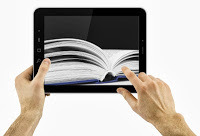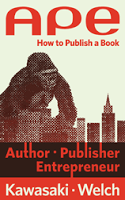Understanding Book Distribution Part 2: Direct Sales of Ebooks
Authors such as Ryan Estrada, Andrew Hyde ( This Book Is About Travel ), and Nathan Barry ( App Design Book ) sell their ebooks via Gumroad. They placed their files on the service and added the link to their websites. People can click on the link, pay for the file, and then download it. The authors pay a transaction and hosting fee to Gumroad.

This method is the simplest, most direct, and possibly offers the highest profit per book. However, it requires the ability to drive people to a website, compared to online resellers who already have traffic. You’ll also need hosting, payment, and customer-service functionality. Other companies that provide this type of service are E-Junkie and ClickBank. Ganxy is a company that provides an ebook-focused product.
Pros:
Direct and immediate control. These companies are big hard disks in the sky with order processing. You make your decisions about pricing and revisions, and they execute.
High profits per book. These companies don’t do more than host your file and handle transactions. Therefore, their costs are lower, and you can make the most money per copy through them.
Cons:
Marketing burden. There’s always a catch! You have total control and can make the most profit per book, but the onus is upon you to get people to your website or to click to buy your ebook.
Reduced synergy. These websites don’t have anything like sales rankings and the “Customers Who Bought This Item Also Bought” synergistic promotion.
Reduced opportunities for affiliate fees. The Amazon Affiliate program enables authors to earn fees from traffic generated by their marketing efforts. For example, after you send someone to your book’s page on Amazon, if that person buys a Samsung TV from Amazon, you can make an affiliate fee. Gumroad and E-Junkie don’t pay affiliate fees, though ClickBank does.
Best suited for only selling the PDF version. These sites can sell any file format that you upload, but this doesn’t mean that your readers will know what format to buy for their reader app and how to install your book. Do you want to help a person trying to read a MOBI file (more on formats later) in iBooks?
Before you go nuts selling books directly, check on sales-tax issues. This applies to US authors who sell to people in the same state of residence—authors outside the United States should check with a tax specialist in their country. Resellers such as Amazon or Apple automatically handle state sales-tax issues for you. When you sell printed books directly to people in your state, it’s your responsibility to report and record taxes.
In most states, the sale of digital goods such as ebooks is not subject to sales tax as long as there is no physical product involved and the transaction/experience is purely digital (online marketing, online distribution). In some states, engaging in physical marketing of a digital product (for example, flyers and meet-the-author events) creates a condition where digital sales may be subject to sales tax.
This issue is a hot and fluid topic in many states because states are looking for alternative sources of revenue. Before you start selling digital copies of your book directly to individuals, you should contact your state’s department of revenue or a tax attorney and ask whether digital sales are subject to sales tax.
Guy Kawasaki has written 12 books, 10 of which were traditionally published. His newest book is APE: Author, Publisher, Entrepreneur - How to Publish a Book, which helps people understand how and why to self-publish.

APE: Author, Publisher, Entrepreneur - How to Publish a Book, by Guy Kawasaki and Shawn Welch, is available as an eBook ($9.99) and in paperback ($24.99). Visit http://apethebook.com/








Published on November 17, 2013 18:47
No comments have been added yet.



